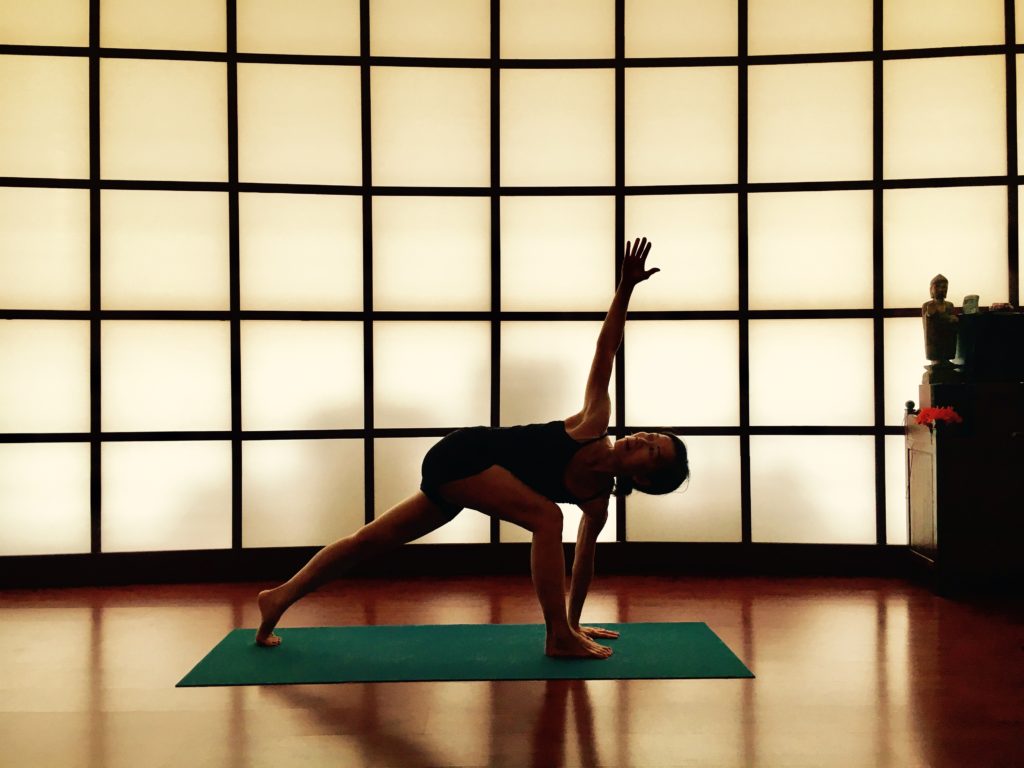Set Your Intention.
See if you can move or be still, without judgment, without expectation.
Without expectation? But, set an intention?
Every time she says these words, they sound new to me even though I hear them every day (almost), at the same time at the same place.
Our yoga teachers, whether it’s Sara or Mira, always begin our yoga class at 7 a.m. with this core tenet right off the bat as we sit on the mat.
At that hour, my body is usually sluggish, so is my mind.
My goal is to wake up, sharpen my mind and strengthen my body so I am ready and fit for that day. My intention is the same as my goal, although sometimes I set my intention specifically to tune into my body signals. What is my body telling me today? What information should I glean from different body parts as they move into different poses? How is my breath today? How does that help me understand my health and well-being today?
My body and mind aren’t the same each day. In fact, the more constant and consistent I am with my yoga practice, the more keenly I notice my body changes and those sensations affect my mind and my mood.
This morning, I sensed how tight my left arm, shoulder and upper back were as I twisted in a prayer pose to my left side (my previously injured, slightly disabled side) trying to stay still with one knee bent and the other on the mat.
I also sensed that I couldn’t follow the instruction to lift my back foot off the mat without losing balance. I slipped. I regained my foothold quickly, but I also lost focus on my breath as I began questioning myself. What’s wrong? How come?
Next, tree pose. More balance is needed. I was shaky. I stumbled. Every step of the way I was aware of the information my body was giving me. My left (weak) side feels heavy and tight. I kept wondering – What’s wrong? How come?
These probing questions were intended to help me identify the source of my tight spots – the cause of the discomfort. At that point, I suddenly remember – ah, I was in New York last week on business! I did not practice yoga for four days in a row! I had 18 hour days for 2 days. I had more than one glass of wine for dinner one night.
I didn’t regret what I did or didn’t do. I didn’t criticize or condemn myself, I just noted them as the likely causes for my imbalance. The next question becomes, what lessons do I learn from this experience?
Set Intention
Intention helps me focus my practice on the over-arching purpose of the practice (health and well-being), rather than the performance of that day. So, what if I slip? Who cares? I get up. I catch my breath. I use my breath to soothe the rough spots and regain my composure. No one is hurt. Nothing is lost. I practice self-soothing. I practice resilience. My intention helps me stay focused on the journey of discipline, the process of success and failures, and the quest for the solution when a problem arises. Intention helps me stay positive on achieving something good for me.
Set Aside Expectation
Expectation, on the other hand, assumes that my practice should and would always be smooth and linear. It assumes that the longer I’ve been a yogi, the better results I should be able to deliver. Expectation breeds angst and judgment when I fail or slip.
That leads to my breath coming short, my mind and body feeling upset. What for? In other words, expectation is counter-productive. Its obsession with performance hurts the process of building stamina and detecting sore points.
In Context, On Balance
Keep in mind that I’m describing intention and expectation in the context of yoga; not in school, at the workplace or in businesses where performance and results are expected as the measure of success, or predicted as a projection of future growth. That’s how a capitalistic society in a modern, western, highly educated and industrialized world functions. Living in such a society, as many of us do, means we have more reasons to take time out to set an intention for our wellness. I think doing regular workout, exercise, yoga or meditation are all great pathways to health and well-being. These pathways are the non-performance periods when we can call “time out” and identify where we’ve gone off balance, so to reset our bodies and recharge our minds.



